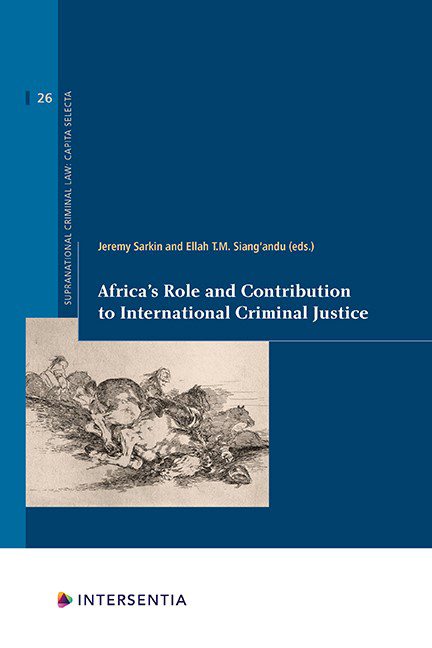Book contents
- Frontmatter
- Acknowledgements
- Contents
- List of Contributors
- Introduction: Understanding the Meaning, Context, Role and Importance of African Criminal Justice on the Continent and Beyond
- Types of International Criminal Courts in Africa
- The Extraordinary African Chambers in the Senegalese Courts and the Development of International Criminal Law in Africa
- The Use of International Criminal Law in African Countries
- The Nuremberg Principles in the Context of Africa: The Theory and Practice of Individual and Corporate Criminal Responsibility
- The Application of Universal Jurisdiction in Africa
- African Victims of Mass Atrocities Before Domestic Jurisdictions and the International Criminal Court: Bargaining for Justice
- The Role of the International Criminal Court in Africa: The Epic Fails?
- Is the African Court on Human and Peoples’ Rights with Criminal Jurisdiction an African Solution to an African Problem?
- Head of State Immunity in the African Context
- Index
The Role of the International Criminal Court in Africa: The Epic Fails?
Published online by Cambridge University Press: 11 February 2021
- Frontmatter
- Acknowledgements
- Contents
- List of Contributors
- Introduction: Understanding the Meaning, Context, Role and Importance of African Criminal Justice on the Continent and Beyond
- Types of International Criminal Courts in Africa
- The Extraordinary African Chambers in the Senegalese Courts and the Development of International Criminal Law in Africa
- The Use of International Criminal Law in African Countries
- The Nuremberg Principles in the Context of Africa: The Theory and Practice of Individual and Corporate Criminal Responsibility
- The Application of Universal Jurisdiction in Africa
- African Victims of Mass Atrocities Before Domestic Jurisdictions and the International Criminal Court: Bargaining for Justice
- The Role of the International Criminal Court in Africa: The Epic Fails?
- Is the African Court on Human and Peoples’ Rights with Criminal Jurisdiction an African Solution to an African Problem?
- Head of State Immunity in the African Context
- Index
Summary
INTRODUCTION
In writing about Africa and the International Criminal Court (ICC) over the past two decades, the temptation to allude to Epic narratives has been ever-present, and one in particular has haunted our collective reflections on the subject. We have written about ‘stormy years’, ‘being caught between Scylla and Charybdis’ and on more than one occasion, an early draft has had the phrase ‘the Odyssey continues’ lurking somewhere in the text, if not the title. Recently, employing Homer's Epic became more difficult, as the Odyssey appeared to be headed towards a precipitous and premature end when African states started making plans for their collective withdrawal from the Rome Statute. While threats of a mass withdrawal have simmered – in the end only Burundi followed through (South Africa demurred) – there seems to be little hope of a rapprochement. In fact, recent developments in the Afghanistan situation suggest another storm might be on the horizon.
On reflection, in our writings at least, it has been unclear who was steering the ship: was the hero of the story the ICC navigating the waters (and avoiding the Siren calls) of international politics, or were African states navigating the waters of international law? In this chapter we want to focus specifically on the role that the ICC has played, not as hero but as protagonist, in Africa over the past two decades. We do so, jumping mythologies, with the intention of neither burying nor praising the ICC, but in order to reflect critically on the role it has played in the demise of this once promising relationship, and we consider whether the story might have turned out differently (or might yet still). For, while much of the blame is currently placed solely at the feet of African states and their hostility towards specific investigations (particularly against heads of state), this chapter aims to show that: (1) the fractures within this relationship have come about as a result of the actions (and inactions) of the ICC and its supporters; and (2) as far as African states’ complaints are concerned, these were general concerns they had about the ICC that were present at its founding in 1998, and these concerns have come to be realised, for the worse, with each passing year.
- Type
- Chapter
- Information
- Africa's Role and Contribution to International Criminal Justice , pp. 191 - 224Publisher: IntersentiaPrint publication year: 2020
- 1
- Cited by



